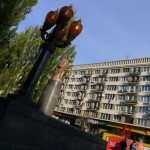New era of co-operation one step closer with EU-Russia agreement report by Hannes Swoboda
 The European Parliament will tomorrow vote on recommendations to the European Commission, Council and the European External Action Service on negotiations over a new EU-Russia agreement, to replace the current agreement dating from 1997. The report aims to foster co-operation and reinforce the core EU values of democracy, human rights and the rule of law in Russia.
The European Parliament will tomorrow vote on recommendations to the European Commission, Council and the European External Action Service on negotiations over a new EU-Russia agreement, to replace the current agreement dating from 1997. The report aims to foster co-operation and reinforce the core EU values of democracy, human rights and the rule of law in Russia.
Hannes Swoboda, President of the S&D Group and rapporteur on the EU-Russia agreement in the European Parliament’s foreign affairs committee, commented on the debate in plenary:
„There are some major issues of concern in Russia and we will not stop pointing these out. But where we can find common ground, we will work together.
„We want a strategic partnership with Russia, but Russia must also play its part and show clear commitment to democracy, human rights and the rule of law. The recent laws on NGOs, treason and espionage are worrying at best as they threaten freedom of expression by intimidating civil society in Russia.
„In the interests of a genuine partnership between European and Russian societies, the report calls for visa liberalisation with Russia.
„Stronger reforms on modernisation and human rights are highly desirable. With this in mind, the S&D Group has tabled additional amendments to the report in view of the draft laws against so-called ‚propaganda of homosexuality‘. Discrimination against LGBT people is no basis for co-operation with the EU.“
On the role of Russia in the world, Hannes Swoboda added:
„Irrespective of these fundamental criticisms, pragmatism is the key word in relations with Russia on issues of global importance. The conflict in Syria, Iran’s nuclear programme and counter-proliferation require practical co-operation between the European Union and Russia.
„Russia’s failure to fully comply with its obligations as a World Trade Organisation (WTO) member remains a stumbling block to concluding the new agreement. The accord will only be signed bilaterally with Russia, not with the Russia-led Customs Union. We want to see Russia’s WTO membership used as a tool for economic modernisation, paving the way for eventual integration in the OECD (Organisation for Economic Co-operation and Development) in the future.“
